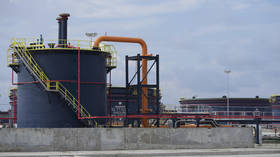russia today - 7/16/2025 3:31:39 PM - GMT (+3 )

Moscow and Abuja have discussed full-cycle cooperation in oil and gas, emphasizing their joint role in OPEC+ decision-making
The partnership of Russia and Nigeria under the OPEC+ framework plays a decisive role in maintaining global oil market stability, Russian Deputy Prime Minister Alexander Novak has said.
His remarks came after a meeting with Nigeria’s minister of finance and coordinating minister for the economy, Wale Edun.
“Our joint work within OPEC+ makes a decisive contribution to ensuring the stability and predictability of the global oil market,” Novak stated, as quoted by the press service of the Russian government on Tuesday. “The decisions taken are based on real market indicators and trends and are aimed at balancing the market in the face of economic challenges.”
Novak emphasized that collective action within OPEC and OPEC+ aligns with the long-term national interests of member countries and helps strengthen their economies.
During the meeting, the two sides also discussed opportunities for full-cycle cooperation in the oil and gas industry, from geological exploration to field development.
Russia is one of the largest participants in OPEC+ and the second largest oil exporter after Saudi Arabia. Nigeria is one of the largest exporters and producers of oil, a member of OPEC and OPEC+.
Last month, Russian Deputy Energy Minister Roman Marshavin met with Nigeria’s chargé d’affaires Garba Satomi Grema to discuss cooperation in geological exploration, petroleum product supply and hydropower engineering, as well as launching a dialogue between the Nigerian National Petroleum Corporation and Russia’s Institute of Oil and Gas Technological Initiatives (IOGTI).
Russia’s energy ties with Africa have been expanding steadily. In March, Dmitry Poduyev, Deputy Director of the Department of International Cooperation at the Russian Ministry of Energy, said that Russia was ready to support African nations by transferring technology, enhancing human capital, and ensuring stable energy supplies. Russian Foreign Minister Sergey Lavrov noted last March that Moscow had doubled its exports of oil products to African countries in 2023–2024.
read more




